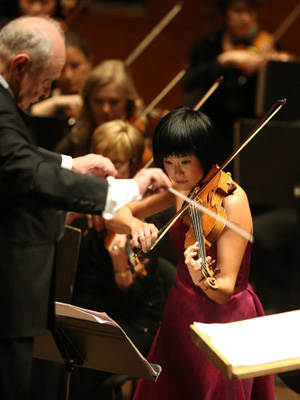The New York Times
By Anthony Tommasini
January 25, 2013
original
link
A Conductor’s Adventurous and Reserved Sides
Lorin Maazel and New York Philharmonic at Avery Fisher Hall

Michelle V. Agins/The New York Times
Lorin Maazel and Jennifer Koh, the featured violinist.
At 82, Lorin Maazel remains one of the most prodigiously skilled and experienced conductors in the business. Yet during his seven-year tenure as music director of the New York Philharmonic, which ended with the 2008-9 season, he sometimes seemed curiously disengaged, especially toward the end.
That was certainly the impression he gave on Thursday night at Avery Fisher Hall for the second of two programs in a return to the Philharmonic’s podium. There was one outstanding performance: the brilliant violinist Jennifer Koh made an auspicious debut on a Philharmonic subscription series program as soloist in Lutoslawski’s “Chain 2: Dialogue for Violin and Orchestra.” Mr. Maazel has always been excellent in contemporary music, where he responds to the challenges of guiding an orchestra through a complex modern score.
But in two standard repertory works, Tchaikovsky’s overture-fantasy “Romeo and Juliet,” which opened the program, and Shostakovich’s formidable Fifth Symphony, which ended it, the playing of the orchestra under Mr. Maazel was often reined in and often listless.
I may have been harder to please than many other audience members on Thursday night, since I had just heard Yannick Nézet-Séguin conduct the Philadelphia Orchestra in a stunning account of Shostakovich’s Fifth a week earlier at Carnegie Hall. This fall the charismatic Mr. Nézet-Séguin, 37, became the music director of the Philadelphia Orchestra, and though his schedule for his first season is limited, he has galvanized that great ensemble.
The Philharmonic players seemed anything but galvanized on Thursday during the Tchaikovsky and Shostakovich works. Mr. Maazel has said that he has no patience with the sentimental and exaggeratedly Romantic interpretations that he often hears. And I am all for bringing out the ingenious craft and intelligence of Tchaikovsky’s music. But in ridding “Romeo and Juliet” of sentimentality, Mr. Maazel also robbed it of passion in this weighty, stolid performance.
In the first movement of the Shostakovich, he seemed to be going for dramatic understatement. He brought a steady tread and exacting execution to the grave opening. During the episode in which the music breaks into militaristic intensity, the Philharmonic played with steely power that shook the hall yet never turned harsh. Still, the effect was calculated. The Largo movement, filled with stretches of quiet anguish, was particularly tepid, though the string sound was often beautiful, especially an eerie moment when the second violins played a sustained, shimmering high tremolo that seemed to be coming into the hall from some far-off place.
Lutoslawski’s 20-minute, four-movement “Chain 2,” completed in 1985, is a pivotal work in that composer’s exploration of two techniques. One involves making linear and melodic phrases seamlessly overlap, rather than letting them unfold like sentences in a musical paragraph; the other touches on Lutoslawski’s experiments with introducing elements of chance into his composition. In this work, during sections headed “Ad libitum,” some musical materials are to be played with free rhythm and in an improvisatory manner, though, as Lutoslawski explained, within fixed parameters.
In a way, none of this has to matter to the listener. At least in a performance as arresting as this one, “Chain 2” comes across as the urgent dialogue for violin and orchestra that Lutoslawski called it. Playing with penetrating sound, myriad colorings and commanding technique, Ms. Koh conveyed the shifting twists of this episodic piece, from its discursive lyrical stretches to its skittish outbursts.
In the orchestral writing there are hints of the composers who influenced Lutoslawski, especially Stravinsky, Bartok and Varèse. Mr. Maazel made those connections vibrant in the bold performance he drew from the Philharmonic.
If only he had been as engaged in the staples.
This program will be repeated on Saturday night at Avery Fisher Hall, Lincoln Center; (212) 875-5656, nyphil.org.
Copyright ©2013 The New York Times
© Jennifer Koh, All Rights Reserved. Photography by Juergen Frank. Site by ycArt design studio